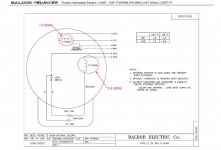Hi all,
I have a Baldor motor (L1430T) 5hp single phase I’m planning on using to run my Champion air compressor (HR5-8). Problem is, the motor makes a loud humming noise, the same ugly sound a motor makes when the start caps go bad and the motor tries to start, but cant. The only difference is, this motor starts right up and runs, but makes that same awful sound while running. It pulls about 30 amps using a clamp-on meter running with no load on a bench top . Name plate says 20.6 amps, but with no load, I would expect something much less. I thought maybe the internal start switch was not disengaging the caps, so I took it apart, but its working fine. I then suspected a bad run cap, so I pulled the one from my other Baldor motor (L1410T) and put in the (L1430T). This made no difference what so ever. Thing is, can’t read the label of the run cap in the (L1430T), but the (L1410T) has a run cap value of 50 mfd 370VAC. Not sure if it would make much difference using a run cap with a value of 10 mfd higher or lower since the two motors are virtually identical.
. Name plate says 20.6 amps, but with no load, I would expect something much less. I thought maybe the internal start switch was not disengaging the caps, so I took it apart, but its working fine. I then suspected a bad run cap, so I pulled the one from my other Baldor motor (L1410T) and put in the (L1430T). This made no difference what so ever. Thing is, can’t read the label of the run cap in the (L1430T), but the (L1410T) has a run cap value of 50 mfd 370VAC. Not sure if it would make much difference using a run cap with a value of 10 mfd higher or lower since the two motors are virtually identical.
Any ideas what else might cause this problem?
Thanks in advance.
I have a Baldor motor (L1430T) 5hp single phase I’m planning on using to run my Champion air compressor (HR5-8). Problem is, the motor makes a loud humming noise, the same ugly sound a motor makes when the start caps go bad and the motor tries to start, but cant. The only difference is, this motor starts right up and runs, but makes that same awful sound while running. It pulls about 30 amps using a clamp-on meter running with no load on a bench top
 . Name plate says 20.6 amps, but with no load, I would expect something much less. I thought maybe the internal start switch was not disengaging the caps, so I took it apart, but its working fine. I then suspected a bad run cap, so I pulled the one from my other Baldor motor (L1410T) and put in the (L1430T). This made no difference what so ever. Thing is, can’t read the label of the run cap in the (L1430T), but the (L1410T) has a run cap value of 50 mfd 370VAC. Not sure if it would make much difference using a run cap with a value of 10 mfd higher or lower since the two motors are virtually identical.
. Name plate says 20.6 amps, but with no load, I would expect something much less. I thought maybe the internal start switch was not disengaging the caps, so I took it apart, but its working fine. I then suspected a bad run cap, so I pulled the one from my other Baldor motor (L1410T) and put in the (L1430T). This made no difference what so ever. Thing is, can’t read the label of the run cap in the (L1430T), but the (L1410T) has a run cap value of 50 mfd 370VAC. Not sure if it would make much difference using a run cap with a value of 10 mfd higher or lower since the two motors are virtually identical.Any ideas what else might cause this problem?
Thanks in advance.




